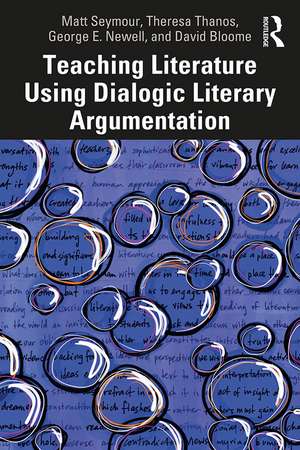Teaching Literature Using Dialogic Literary Argumentation
Autor Matt Seymour, Theresa Thanos, George E. Newell, David Bloomeen Limba Engleză Paperback – 20 mai 2020
| Toate formatele și edițiile | Preț | Express |
|---|---|---|
| Paperback (1) | 367.46 lei 43-57 zile | |
| Taylor & Francis – 20 mai 2020 | 367.46 lei 43-57 zile | |
| Hardback (1) | 762.81 lei 43-57 zile | |
| Taylor & Francis – 20 mai 2020 | 762.81 lei 43-57 zile |
Preț: 367.46 lei
Nou
Puncte Express: 551
Preț estimativ în valută:
70.34€ • 76.43$ • 59.12£
70.34€ • 76.43$ • 59.12£
Carte tipărită la comandă
Livrare economică 21 aprilie-05 mai
Preluare comenzi: 021 569.72.76
Specificații
ISBN-13: 9780367252199
ISBN-10: 0367252198
Pagini: 174
Ilustrații: 4
Dimensiuni: 152 x 229 x 10 mm
Greutate: 0.25 kg
Ediția:1
Editura: Taylor & Francis
Colecția Routledge
Locul publicării:Oxford, United Kingdom
ISBN-10: 0367252198
Pagini: 174
Ilustrații: 4
Dimensiuni: 152 x 229 x 10 mm
Greutate: 0.25 kg
Ediția:1
Editura: Taylor & Francis
Colecția Routledge
Locul publicării:Oxford, United Kingdom
Public țintă
PostgraduateCuprins
Chapter 1 - Introduction Section
I. Foundations for Teaching Dialogic Literary Argumentation: Learning to Argue
Chapter 2 – What is Dialogic Literary Argumentation?
Chapter 3 – Reading and Writing Literature are Social and Dialogic
Chapter 4 – Classroom Conversations to Promote the Principles of Dialogic Literary Argumentation and to Establish a Shared Language for Engaging Literature
Chapter 5 – Establishing a Dialogic Rationality
Section II. Embracing Complexity: Arguing to Learn
Chapter 6 – Argumentation as Inquiry and Learning
Chapter 7 – Dialogic Literary Argumentation as Exploration of the Human Condition
Chapter 8 – Creating a Classroom Environment that Encourages Learning to take Risks with Dialogic Literary Argumentation
Chapter 9 – Conceptualizing Dialogic Literary Argumentation across the Academic Year
Section III Assessing Student Work and Engagement with Dialogic Literary Argumentation
Chapter 10 – Assessing Students’ Judgement and Insight with Dialogic Literary Argumentation Over Time
Chapter 11 – Providing Feedback on Students’ Written Dialogic Literary Arguments
I. Foundations for Teaching Dialogic Literary Argumentation: Learning to Argue
Chapter 2 – What is Dialogic Literary Argumentation?
Chapter 3 – Reading and Writing Literature are Social and Dialogic
Chapter 4 – Classroom Conversations to Promote the Principles of Dialogic Literary Argumentation and to Establish a Shared Language for Engaging Literature
Chapter 5 – Establishing a Dialogic Rationality
Section II. Embracing Complexity: Arguing to Learn
Chapter 6 – Argumentation as Inquiry and Learning
Chapter 7 – Dialogic Literary Argumentation as Exploration of the Human Condition
Chapter 8 – Creating a Classroom Environment that Encourages Learning to take Risks with Dialogic Literary Argumentation
Chapter 9 – Conceptualizing Dialogic Literary Argumentation across the Academic Year
Section III Assessing Student Work and Engagement with Dialogic Literary Argumentation
Chapter 10 – Assessing Students’ Judgement and Insight with Dialogic Literary Argumentation Over Time
Chapter 11 – Providing Feedback on Students’ Written Dialogic Literary Arguments
Notă biografică
Matt Seymour is a Doctoral Candidate at The Ohio State University, USA. He is a former high school English language arts teacher.
Theresa Thanos is a Doctoral Candidate at The Ohio State University, USA. She is a former middle school and high school English language arts teacher.
George E. Newell is Professor of Teaching and Learning at The Ohio State University, USA, and Principal Investigator of The Ohio State University Argumentative Writing Project.
David Bloome is the EHE Distinguished Professor of Teaching and Learning and Director of the Center for Video Ethnography and Discourse Analysis at The Ohio State University, USA.
Theresa Thanos is a Doctoral Candidate at The Ohio State University, USA. She is a former middle school and high school English language arts teacher.
George E. Newell is Professor of Teaching and Learning at The Ohio State University, USA, and Principal Investigator of The Ohio State University Argumentative Writing Project.
David Bloome is the EHE Distinguished Professor of Teaching and Learning and Director of the Center for Video Ethnography and Discourse Analysis at The Ohio State University, USA.
Descriere
Introducing a new framework for teaching and learning literature in secondary schools, this book presents Dialogic Literary Argumentation as an inquiry-based approach to engage students in communicating and exploring ideas about literature.
